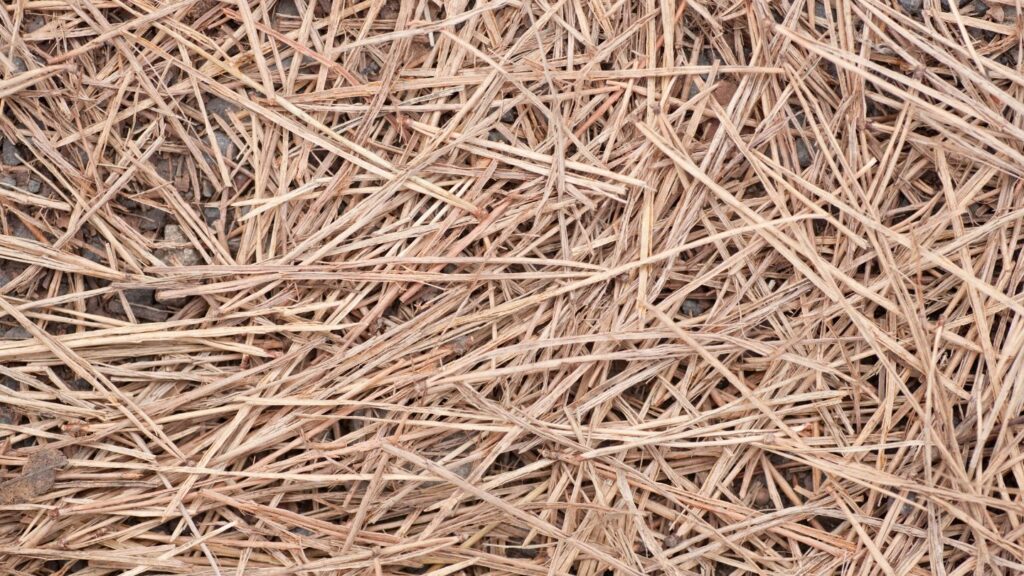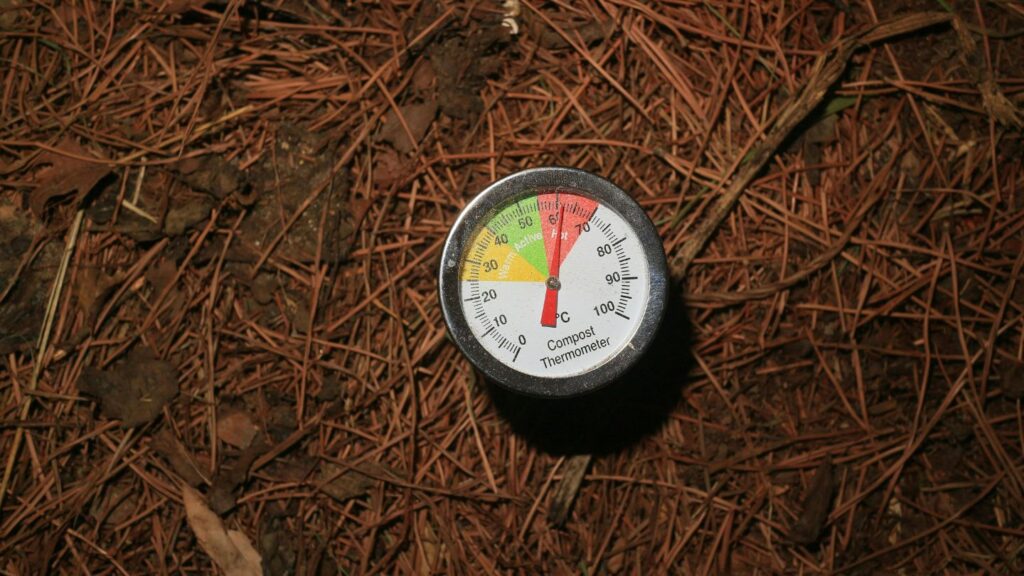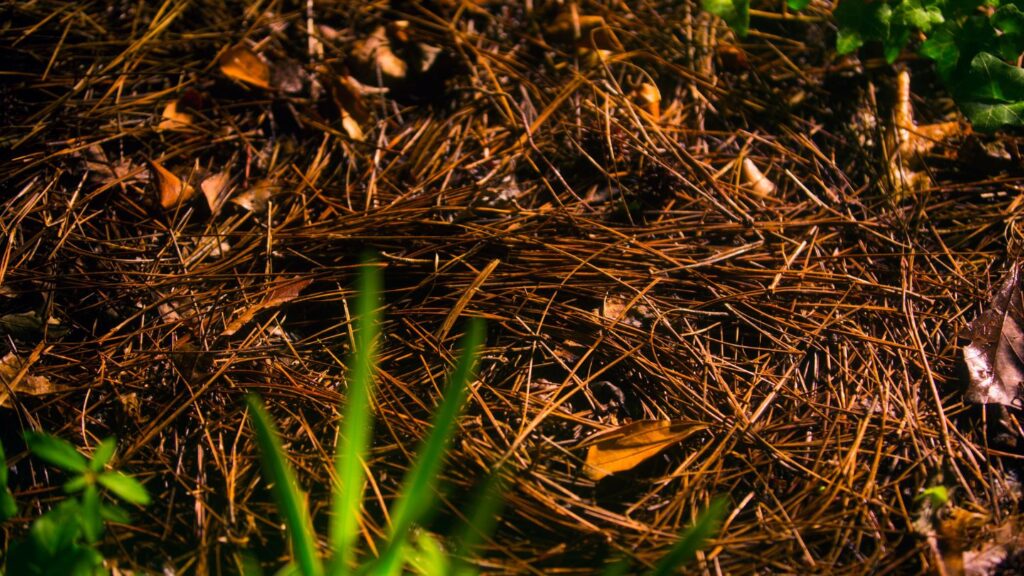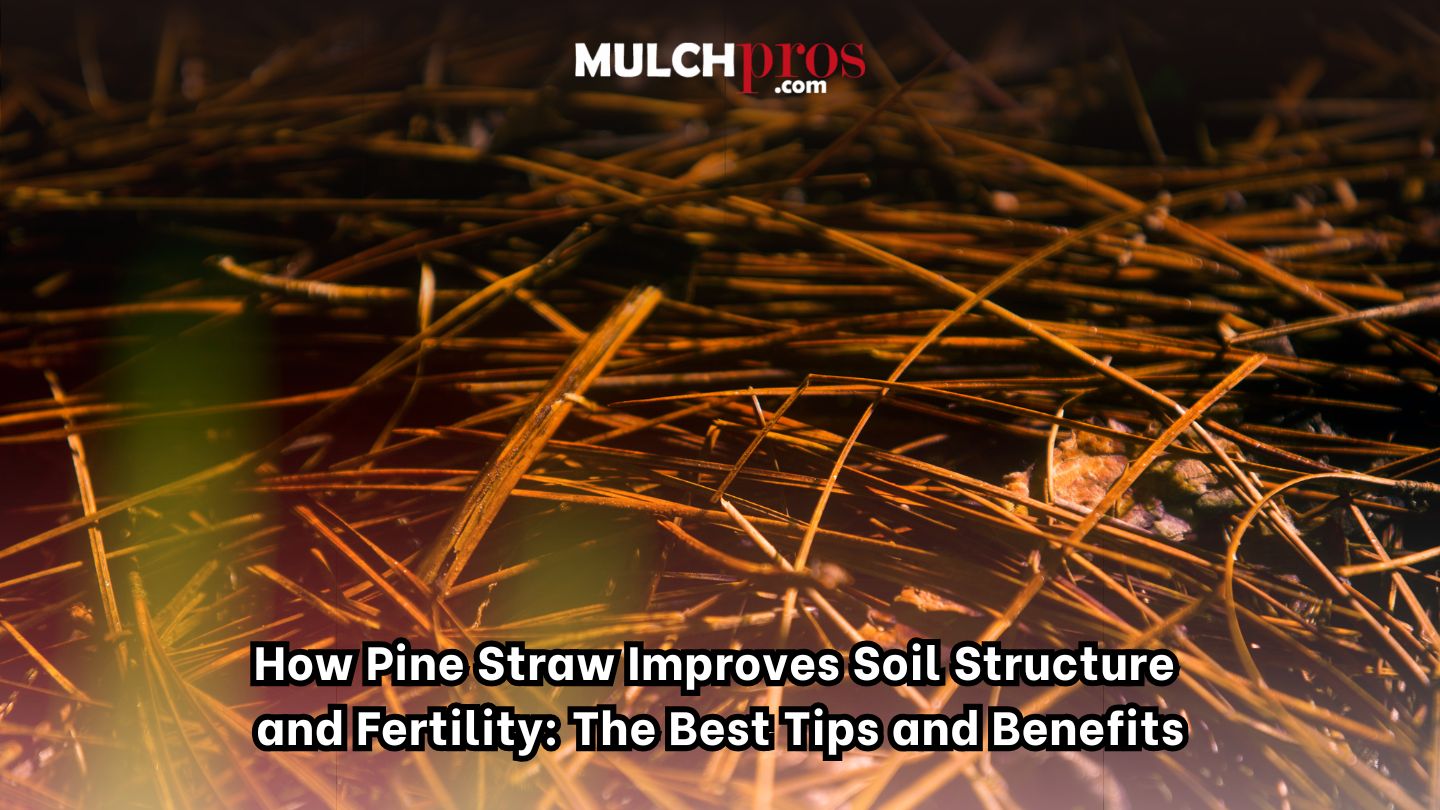Are you interested in understanding the ways pine straw can enhance soil structure and boost fertility? By preventing soil compaction, pine straw improves aeration and fosters an environment where beneficial soil organisms can thrive. Over time, as it breaks down, pine straw adds valuable organic matter to the soil, which leads to improved plant growth.
Key Takeaways
- Pine straw improves soil structure and fertility by increasing organic content, enhancing aeration, and promoting beneficial organisms like earthworms.
- Using pine straw as mulch conserves moisture, reduces weed competition, and stabilizes soil, making it effective for healthy garden growth.
- Pine straw is a cost-effective, renewable resource that supports sustainable landscaping practices and has a lower environmental impact compared to heavier mulches.
The Role of Pine Straw in Soil Structure
Pine straw significantly contributes to the improvement of soil texture and an increase in organic content, which is essential for fostering a soil environment favorable to the expansion of roots. By preventing soil compaction, pine straw enhances both root development and water infiltration, creating optimal conditions for plant growth.
Pine straw provides a suitable habitat for advantageous soil organisms such as earthworms and microbes. The presence of these organisms plays an integral role in maintaining the overall health of the soil.
Enhancing Aeration
Pine straw plays a vital role in improving soil aeration, which facilitates the circulation of air within the soil. This ensures that plant roots receive the essential oxygen they need for robust growth.
Pine straw contributes to creating a stable microenvironment by maintaining uniform soil temperatures. This stability helps prevent stress on plants and fosters their overall well-being.
Promoting Beneficial Soil Organisms
Pine straw supports a diverse population of beneficial soil organisms, including earthworms and microorganisms that drive essential soil processes. These organisms contribute to natural nutrient cycling, breaking down organic materials and enriching the soil.
Additionally, their movement helps aerate the soil and create porous channels that improve root expansion. This biological activity supports soil resilience, particularly in landscaped environments where soil may otherwise be compacted or low in biodiversity.
Reducing Soil Compaction
Mulch made from pine straw effectively prevents the compaction of soil, which in turn promotes improved water infiltration and root development. As it is less dense than many other materials, pine straw allows for more effective percolation of water and gives plant roots ample room to expand.
The decrease in soil compaction brought about by using pine straw mulch aids in enhancing the overall health of plants. It does so by facilitating better absorption of water and nutrients by the plants.
Pine Straw as a Source of Organic Matter

Utilizing pine straw mulch aids in preserving a more open soil structure, which is conducive to the efficient growth of roots and ensures proper drainage of water. Pine straw plays a vital role in conserving nutrients necessary for soil fertility by averting erosion, thereby sustaining the nutrient-dense topsoil as time progresses.
The presence of pine straw helps to inhibit weed proliferation, ensuring that garden plants have better access to both moisture and essential nutrients, thus promoting their vigorous development.
Decomposition Process
The breakdown of pine straw contributes essential nutrients to the soil as it decays. This natural decomposition process adds substantial organic matter that markedly boosts soil fertility.
As a result of the released nutrients from decomposing pine straw, there is an overall improvement in soil health, which in turn promotes better plant growth.
Improving Soil Fertility
As pine straw breaks down, it contributes nutrients such as nitrogen and carbon, enhancing soil fertility over time. The decomposition process stimulates microbial populations, which in turn supports a more active and fertile soil environment. In professionally managed landscapes, consistent replenishment of pine straw mulch ensures an ongoing nutrient supply and promotes strong plant performance across all seasons.
Enhancing Soil Structure
Decomposing pine straw contributes essential organic matter that binds soil particles into stable aggregates. This structural improvement enhances water infiltration, prevents surface crusting, and allows for better nutrient mobility.
Landscapers often rely on pine straw mulch not just for its appearance but for its long-term impact on soil texture, especially in areas where clay or sandy soils need structural improvement for better root support.
Moisture Retention Benefits
Acting as a natural barrier to evaporation, pine straw serves the important function of retaining soil moisture. By doing so, it limits weed proliferation and helps prevent the compacting of soil.
The enhanced retention of moisture from using pine straw mulch ensures that plants remain well-hydrated. This conservation effect not only sustains plant health but also cuts down on watering needs and associated expenses.
Consistent Soil Moisture Levels
Ensuring stable soil moisture levels, which are vital for healthy plant growth, can be achieved by maintaining a layer of pine straw. It is beneficial to apply a substantial layer of pine straw mulch, about 3 inches thick, as this aids in preserving these crucial moisture levels that promote plant health.
Reducing Water Evaporation
Employing pine straw as mulch is beneficial in decreasing the speed at which water evaporates from the surface of the soil. The composition of this mulch type serves to retain moisture, thereby providing plants with adequate hydration needed for their development.
By diminishing water evaporation rates, pine straw mulch contributes to enhanced water preservation and improved health of plants.
Supporting Plant Health
By maintaining stable soil moisture levels and improving soil quality, pine straw helps plants better withstand environmental stress. Landscapers value pine straw mulch for its ability to support drought resistance and reduce the incidence of water stress during hot or dry periods. It also acts as a protective layer that reduces direct contact between plant stems and overly wet soil, minimizing disease risk and promoting healthier root zones.
Read more: Top Benefits of Pine Straw for Your Garden and Landscaping
Soil Temperature Regulation

Acting as a protective barrier, pine straw mulch serves to stabilize soil temperature by providing insulation. This creates a consistent environment for plant roots by lessening the variations in soil temperature due to extreme weather conditions. It shields the soil from the detrimental effects of heavy rainfall and powerful gusts of wind.
Insulating Soil
By acting as an insulator, pine straw aids in stabilizing soil temperatures. It preserves cooler conditions for plant roots within landscape beds during periods of hot weather and retains heat in the soil when it’s cold, which is conducive to vigorous root growth.
Protecting Plant Roots
By forming a protective layer, pine straw aids in keeping soil temperatures steady. It is essential to protect plant roots against severe swings in temperature, as stable conditions underground are vital for their well-being. The prevention of harsh temperature changes by the pine straw encourages robust root formation and enhances the general growth of plants.
Weed Suppression with Pine Straw

Pine straw mulch proficiently hampers the proliferation of weeds by obstructing sunlight and vying for essential resources such as nutrients and water. Although it plays a significant role in diminishing weed competition, pine straw is not a foolproof method for complete weed eradication.
The longleaf variant of pine straw stands out due to its remarkable resilience and extended needle length, making it particularly adept at inhibiting weed growth while also preserving moisture more effectively. Employing pine straw around garden perimeters not only augments aesthetic appeal but also provides substantial benefits to soil vitality and aids in the suppression of weeds.
Blocking Sunlight
By creating a thick, mat-like barrier on the soil, pine straw impedes sunlight from permeating the ground. This is crucial as it hinders weed seeds from sprouting since weeds depend heavily on direct sunlight for growth and become formidable competitors for nutrients when established. Pine straw’s ability to block this light diminishes the chances of weeds taking root, thus favoring the development of plants that are intentionally cultivated.
Incorporating pine straw into landscape installations provides dual benefits of function and appearance. Professionals use it to frame garden beds, tree rings, and pathways, ensuring weed suppression and soil protection. When properly installed by experienced crews, pine straw can serve as both an attractive and high-performance ground cover that enhances the landscape’s structure and health.
Durable Barrier
By forming a durable barrier on the ground, pine straw efficiently blocks sunlight from reaching the soil, thereby impeding weed growth. Its capability to inhibit weeds is complemented by its permeability, allowing both moisture and nutrients to access the soil below. Among various mulching alternatives, long-needle pine straw stands out for its resilience and superior performance in curbing weed proliferation.
Despite pine straw’s proficiency in restraining weeds, denser substances, such as traditional mulch, typically surpass it when it comes to thwarting the emergence of unwanted vegetation.
Reduced Weed Competition
Utilizing pine straw for weed control enhances the garden’s well-being by diminishing nutrient and water competition. This allows desired plants to obtain an increased share of these resources, thereby fostering their growth and improving their health.
As a result of this diminished rivalry among plants, the garden thrives as it provides a conducive environment in which the preferred flora can prosper.
Erosion Control Benefits
Pine straw serves as a natural mulch that establishes a stabilizing cover over soil on inclined terrains, thereby diminishing erosion risks. It assists in anchoring the soil by creating a defensive layer that cushions the blow of raindrops against the earth’s surface, helping to curb both erosion and soil depletion.
On sloping grounds, pine straw maintains its position even during intense rainfall, successfully averting any significant displacement of the earth.
Stabilizing Soil
Pine straw’s composition aids in securing the soil, thereby reducing erosion during intense rainfall. Its intertwined structure is particularly effective at restraining soil displacement on inclined surfaces. As a result, pine straw maintains the integrity of soils on slopes and effectively reduces surface runoff.
Employing pine straw as mulch serves to not only fortify the ground but also improve the condition of garden ecosystems overall.
Read more: Unlocking the Garden Secrets: Pine Straw’s Multitude of Uses
Protecting Soil Surface
Utilizing pine straw is an efficient method for controlling erosion, essential in safeguarding the soil surface against severe weather conditions like heavy rain and strong winds. By curtailing surface runoff, pine straw mulch diminishes the chances of soil degradation and preserves fertile topsoil from being lost. It fortifies the soil by preserving its structure and uniformity amidst climatic disruptions.
Employing pine straw does more than just defend the soil’s exterior. It also promotes enduring health and sustainability of the soil.
Long-Term Soil Health
Maintaining the health and sustainability of soil over the long term is heavily dependent on erosion prevention. By stabilizing the soil, pine straw mulch diminishes surface runoff and aids in preventing soil erosion. It acts as a protective barrier for the soil surface against intense rain and wind.
Sustainable soil health is encouraged through the stabilization of the earth and its safeguarding from external elements through the combined effect of pine straw.
Cost Considerations and Environmental Impact
Pine straw is often a more cost-effective mulching material when compared to alternatives such as hardwood mulch or decorative stone. Its lightweight nature makes it easier to transport and apply, particularly for professional landscapers managing large or sloped properties. Though it may need more frequent replenishing than denser materials, its affordability and widespread availability make it an excellent choice for maintaining soil health across diverse landscapes.
Cost-Effective Solution
In regions where pine trees are abundant, pine straw offers a practical and cost-conscious solution for mulching. Landscaping professionals often choose it for large-scale coverage due to its ease of installation and low material cost per bale. While it may need refreshing seasonally, its aesthetic value and functional benefits make it a smart investment for property managers and homeowners alike.
Renewable Resource
Pine needles, which are naturally shed from trees, serve as the source of pine straw, making it a sustainable and renewable resource. This method of collection guarantees an ongoing availability of pine straw to be used as mulch without exhausting natural resources.
By employing these fallen needles, the use of pine straw presents an environmentally responsible and sustainable choice for gardening and landscaping purposes.
Sustainable Landscaping
Using pine straw in landscape applications promotes eco-friendly practices by reducing reliance on synthetic inputs and minimizing landscape waste. Professionals favor it for its low carbon footprint and the fact that it is a renewable byproduct of pine trees. Its use supports sustainable landscaping while improving overall soil vitality and plant performance.
The integration of pine straw within your garden improves not just the vitality of the soil and growth of plants but also adheres to practices that are both sustainable and based on renewable resources.
Read more: Mastering Soil and Erosion Control: Safeguarding Your Landscape’s Future
Summary
Pine straw provides an array of benefits that can transform your garden or landscape into a flourishing, robust environment. From enhancing soil structure and fertility to retaining moisture and suppressing weeds, pine straw is a versatile, eco-friendly mulching option. Its cost-effectiveness and sustainable attributes make it an ideal choice for those aiming to boost their soil’s health and support sustainable landscaping practices. By incorporating pine straw into your landscaping, you can cultivate a vibrant and resilient garden that thrives throughout the year.
At Mulch Pros Landscape Supply, we are committed to offering premium pine straws in Milton along with other high-quality landscape materials to foster healthy, sustainable landscapes. Whether you’re a landscape professional or managing your own outdoor space, our products are meticulously sourced to promote soil vitality, weed control, moisture retention, and erosion prevention. Pine straw is one of the most versatile, eco-friendly options available—and we’re here to help you make the most of it. Contact us today to transform your landscape!
Frequently Asked Questions
Can pine straw change soil pH over time?
Pine straw has minimal impact on soil pH and does not significantly acidify the soil as commonly believed.
Is pine straw suitable for all plant types and garden styles?
Yes, pine straw works well in most landscapes, especially around trees, shrubs, and flower beds, due to its lightweight and natural look.
How often should pine straw be refreshed in a landscape?
Typically, pine straw should be replenished once or twice a year to maintain coverage, color, and performance benefits.


